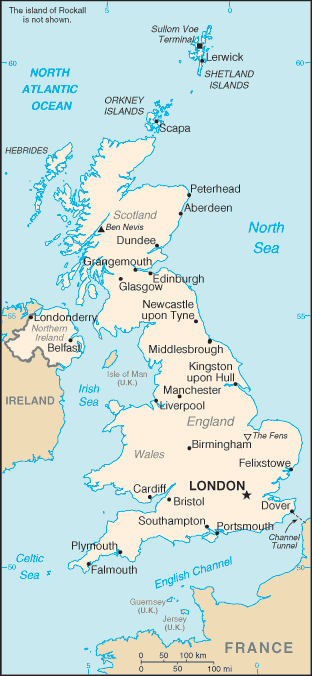United Kingdom
The United Kingdom of Great Britain and Northern Ireland is a country in western Europe. It is a Commonwealth Realm, and a member of the European Union and NATO. Usually known simply as the United Kingdom or the UK, it is also often inaccurately named Great Britain, Britain or England (the most populous of the home nations). The UK has four constituent parts, three of which — the ancient nations of England, Wales and Scotland — are located on the island of Great Britain. The fourth part is Northern Ireland, which is located on the island of Ireland. The UK was formed by a series of Acts of Union which united the Kingdom of England (which included Wales as a principality) with those of, first, Kingdom of Scotland and then Kingdom of Ireland under a single government in London. The greater part of Ireland left the United Kingdom of Great Britain and Ireland) in 1922 to form the independent Irish Free State (in which, until 1949, the British monarch was also King of Ireland). The Free State later became the Republic of Ireland. Six counties in the north-eastern portion of the island, meanwhile, remained a part of the United Kingdom, forming Northern Ireland to this day. Great Britain, or just Britain, is the geographical name of the largest of the British Isles (often also including its smaller neighbouring islands, though never Ireland). Politically, the term Great Britain refers collectively to the nations of England, Wales and Scotland (i.e., the United Kingdom except for Northern Ireland). This political usage of "Great Britain" dates from the personal union of the Crowns of Scotland and England (including Wales) in 1603, with the term being used in the sense "all of Britain". In the early years of the "United Kingdom of Great Britain", formed by the Act of Union of 1707, it was customary to refer officially to Scotland and to England and Wales as, respectively, "North Britain" and "South Britain", though the usage never really caught on. It should be noted that the practice by some, the informal media in particular, of using "(Great) Britain" as shorthand for the United Kingdom is an inaccuracy which can cause offence. Scotland and England have existed as separate unified entities since the 10th century. Wales, under English control since the Statute of Rhuddlan in 1284, became part of the Kingdom of England by the Act of Union 1536. With the Act of Union 1707, the separate kingdoms of England and Scotland, having shared the same monarch since 1603, agreed to a permanent union as the Kingdom of Great Britain. This occurred at a time when Scotland was on the brink of economic ruin and was deeply unpopular with the broader Scottish population. The Act of Union 1800 united the Kingdom of Great Britain with the Kingdom of Ireland, which had been gradually brought under English control between 1169 and 1691, to form the United Kingdom of Great Britain and Ireland. This was also an unpopular decision, taking place just after the unsuccessful United Irishmen Rebellion of 1798. The timing, when further Napoleonic intervention or an invasion was feared, was predominantly due to security concerns. In 1922, after bitter fighting which echoes down to the current political strife, the Anglo-Irish Treaty partitioned Ireland into the Irish Free State and Northern Ireland, with the latter remaining part of the United Kingdom. As provided for in the treaty, Northern Ireland, which consists of six of the nine counties of the Irish province of Ulster, immediately opted out of the Free State and to remain in the UK. The nomenclature of the UK was changed in 1927 to recognise the departure of most of Ireland, with the name United Kingdom of Great Britain and Northern Ireland being adopted. The United Kingdom, the dominant industrial and maritime power of the 19th century, played a leading role in developing Western ideas of property, liberty, capitalism and parliamentary democracy - to say nothing of its part in advancing world literature and science. At its zenith, the British Empire stretched over one quarter of the earth's surface. The first half of the 20th century saw the UK's strength seriously depleted in two World Wars. The second half witnessed the dismantling of the Empire and the UK rebuilding itself into a modern and prosperous nation. The UK is currently weighing the degree of its integration with continental Europe. A member of the European Union, it has not yet chosen to adopt the euro, owing to internal political considerations and the government's judgement of the prevailing economic conditions. There is considerable internal opposition to European integration within the UK, and some British economists demand that the European Central Bank be reformed to mirror the Bank of England before the UK joins the Euro, a demand which, given the German economic difficulties following adoption of the Euro, would seem to be possible in the future. Constitutional reform is also a current issue in the UK. The House of Lords has been subjected to ongoing reforms, Scotland elected its own parliament in 1999 and in the same year, devolved assemblies were created in Wales and Northern Ireland. According to opinion polls, the monarchy remains generally popular in spite of recent controversies. Support for a British Republic usually fluctuates between 15% and 25% of the population, with roughly 10% undecided or indifferent.
This article is licensed under the GNU Free Documentation License. It uses material from the Wikipedia article "United Kingdom". |
|||||||||

